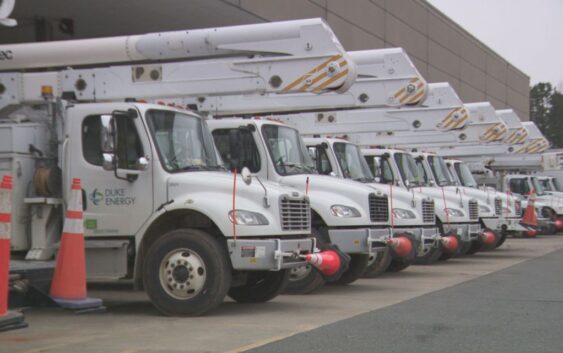- Avery County residents reflect on Hurricane Helene, 6 months later
- Six months since Hurricane Helene, Ashe County residents struggling to rebuild
- Stein honors North Carolinians, first responders killed during Hurricane Helene: 'Incredible bravery'
- Stein honors North Carolinians, first responders killed during Hurricane Helene: 'Incredible bravery'
- Stein honors victims of Hurricane Helene 6 months after storm's devastation
Power outages: Widespread impacts in NC mountains after severe weather outbreak

Strong storms caused tens of thousands of power outages in North Carolina, toppling trees and power lines.
CHARLOTTE, N.C. — Tens of thousands of power outages were reported across North Carolina and South Carolina as a line of strong-to-severe storms pushed toward the Charlotte area early Sunday.
As of 11:05 a.m. Sunday, at least 44,000 outages were reported in North Carolina. That number was down from over 52,000 earlier in the day. The vast majority of those were west of Charlotte, but Duke Energy reported several hundred outages in Mecklenburg County.
Duke Energy spokesperson Logan Stewart said the utility provider is prepared to handle whatever the storm throws its way.
“We have teams out there that live in the Asheville area that are responding to that,” Stewart said. “We’ve kept our crews here in this area just to kind of see what the impacts are going to be and then if we need to, we’ll deploy those folks out into the field.”
Weather Impact Chief Meteorologist Brad Panovich says these storms will bring heavy rain, gusty winds and the threat of tornadoes to the Charlotte area. They’re expected to push east of the Queen City by around 12 p.m. The biggest risks in Charlotte will be damaging winds and heavy rain, but Panovich said these fast-moving storms could spin up a few isolated tornadoes.
In order to receive timely severe weather alerts, be sure to have multiple ways to receive weather alerts. One of those ways can be the WCNC Charlotte mobile app. Since the storms could arrive during the early morning hours, be sure to have a weather radio or other tool to awaken you in the event of a nearby storm.
Panovich says everyone should have three ways to receive real-time severe weather alerts. These include wireless emergency alerts that are built into most smartphones, weather apps and a NOAA weather radio that’s set to alarm during a tornado warning or other emergency.